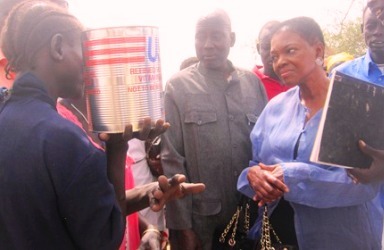Over 4 million S. Sudanese remain food insecure, says report
By Julius N. Uma
February 4, 2012 (JUBA) – At least 4.7 million people in South Sudan are likely to be food insecure this year, a joint crop and food security assessment report released by the United Nations Food and Agricultural Organization (FAO) and World Food Programme (WFP) says.

This figure, according to the report, also includes about 1 million people who are said to be severely food insecure.
The number of food insecure people, the CFSAM report estimates, is likely to rise from 1 to 2.2 million, if conflict continues to cause major population displacements and food prices keep rising.
“This is a rapidly approaching crisis that the world cannot afford to ignore,” Chris Nikoi, WFP’s country director said in a statement.
He added, “The situation is dire and we are doing everything we can to be ready, but we are running out of time.”
The UN has already earmarked $760 million for humanitarian needs in South Sudan, but says the organisation is “extremely” stretched in its efforts to provide assistance to over 120,000 displaced by the country’s worst ever ethnic violence.
The report mainly cites poor harvests, increased demand for food, high prices, conflict and massive influx of returnees from the north as having greatly contributed to the worrying food insecurity trends.
“Poor rainfall in the early season as largely responsible for the lower harvest, with ongoing conflict compounding the problem by disrupting normal agricultural activities,” the report reads in part.
Also noted during the assessment was a shortfall in cereal production, which is reportedly weighing heavily on the already distressed communities.
Last year, according to the report, South Sudan’s national cereal production was about 19 percent below that of the previous year, and 25 percent lower than the average for the last five years. It, however, estimates the cereal deficit for 2012 to be more than 470,000 metric tons, reportedly half of the country’s total consumption requirements for the year.
As a remedy, however, the report agitates for more incentives that enhance household food production and income, a broad-based cross-sectoral approach to food security, strengthening of nutrition linkages as well as enhanced role of markets and trade.
Meanwhile, WFP has launched an emergency operation aimed at reaching nearly 2.7 million people this year. In order to achieve this, the world largest humanitarian agency is seeking donor support to cover the current shortfall in funding of $160m.
(ST)
